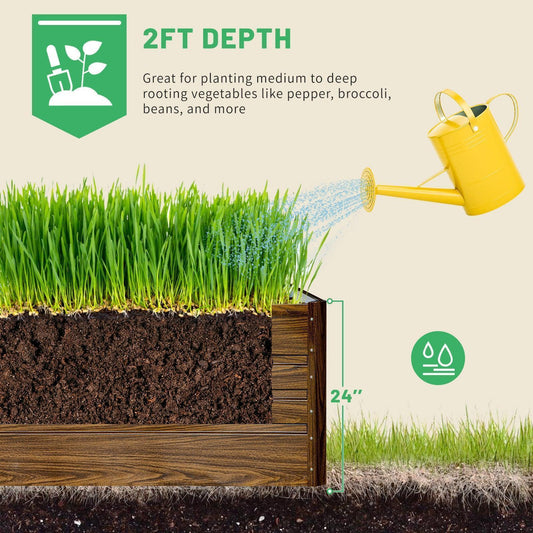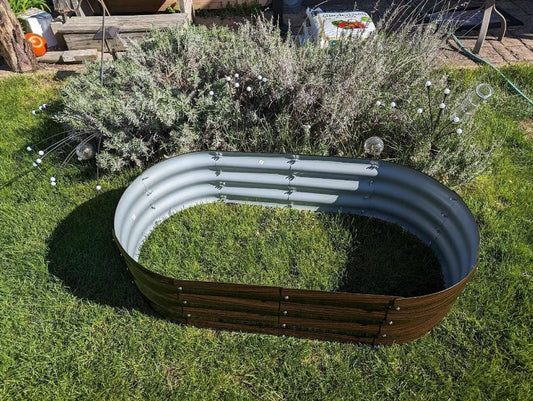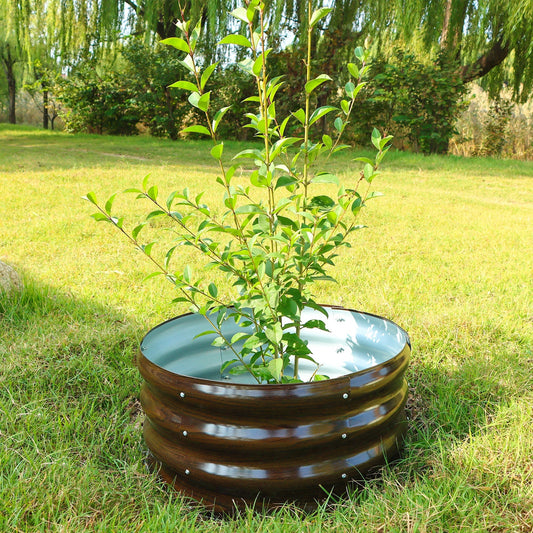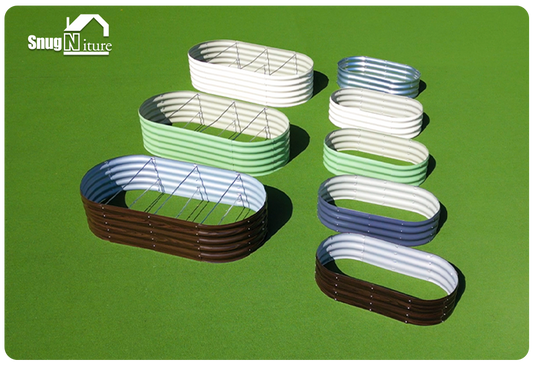Why Every Home Needs Raised Garden Beds for a Sustainable Future
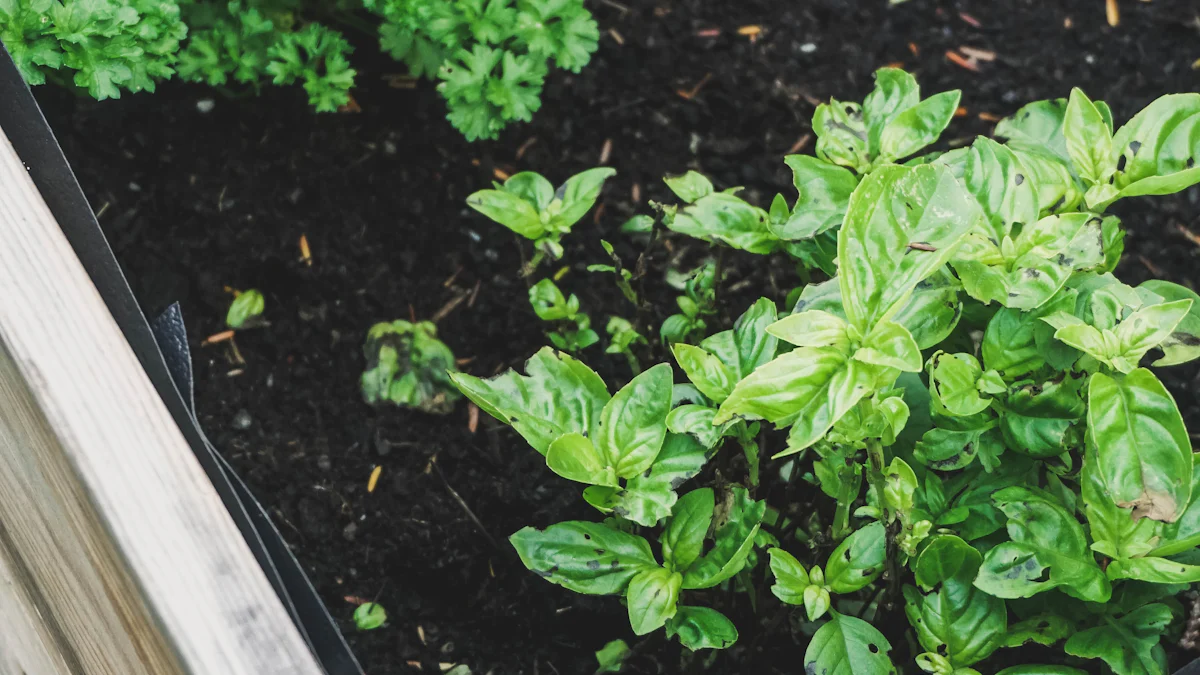 Imagine transforming your backyard into a thriving oasis that supports the planet while enriching your life. Raised garden beds are at the heart of the green revolution, offering a practical way to embrace eco-friendly gardening. These beds reduce land compression and pollution, promoting ecological balance and biodiversity. By using organic materials like recycled wood and natural fertilizers, you can minimize waste and harmful chemicals. This approach not only protects the environment but also enhances plant photosynthesis, creating healthier, more vibrant gardens. When you embrace the green revolution with raised garden beds, you take a step toward sustainability and a brighter, greener future.
Imagine transforming your backyard into a thriving oasis that supports the planet while enriching your life. Raised garden beds are at the heart of the green revolution, offering a practical way to embrace eco-friendly gardening. These beds reduce land compression and pollution, promoting ecological balance and biodiversity. By using organic materials like recycled wood and natural fertilizers, you can minimize waste and harmful chemicals. This approach not only protects the environment but also enhances plant photosynthesis, creating healthier, more vibrant gardens. When you embrace the green revolution with raised garden beds, you take a step toward sustainability and a brighter, greener future.Environmental Benefits of Raised Garden Beds
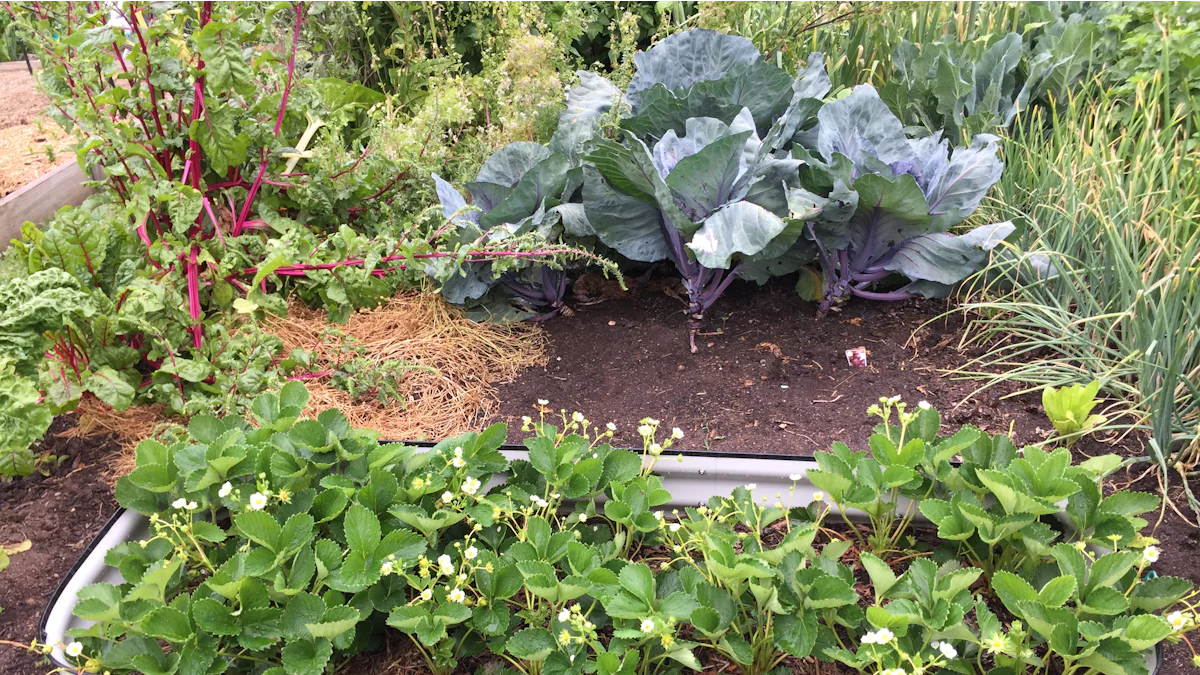
Enhancing Soil Health
Preventing soil compaction and erosion
When you use raised garden beds, you protect the soil from compaction caused by foot traffic. Unlike traditional gardening, where walking on the soil can compress it, raised beds keep the growing area untouched and loose. This allows plant roots to spread freely, improving their growth. Additionally, raised beds help prevent soil erosion. The contained structure keeps the soil in place, even during heavy rains, ensuring your garden remains productive and intact.
Maintaining nutrient-rich soil
Raised garden beds give you complete control over the soil quality. You can fill them with nutrient-rich soil mixes tailored to your plants' needs. Over time, organic matter like compost can be added to maintain fertility. This approach ensures your garden thrives without relying on synthetic fertilizers, making it both eco-friendly and sustainable. Healthy soil leads to healthier plants, which means better yields and a more vibrant garden.
Water Conservation in Gardening
Efficient irrigation techniques
Raised garden beds make watering more efficient. Drip irrigation systems work exceptionally well with these beds, delivering water directly to the roots. This method can use up to 80% less water compared to traditional overhead watering, reducing evaporation and ensuring every drop counts. By focusing water where it’s needed most, you conserve resources while keeping your plants hydrated.
Reducing water waste and runoff
The design of raised beds minimizes water wastage. Their confined space allows you to control how much water is applied, preventing overwatering and runoff. Materials like organic mulch can also be added to the surface to retain moisture, reducing the need for frequent watering. With raised garden beds, you contribute to water conservation while maintaining a lush, thriving garden.
|
Benefit |
Description |
|---|---|
|
Raised beds allow the soil to drain well, avoiding waterlogged conditions. |
|
|
Better Water Retention |
Raised beds help manage water retention with materials like organic mulch. |
|
Reduced Water Wastage |
Irrigation is less wasteful in the confined space of a raised bed. |
Supporting Biodiversity
Attracting pollinators and beneficial insects
Raised garden beds can become a haven for pollinators like bees and butterflies. By planting pollinator-friendly flowers and herbs, you invite these essential creatures into your garden. Beneficial insects, such as ladybugs and lacewings, also thrive in this environment, helping to control pests naturally. This creates a balanced ecosystem where plants and insects work together in harmony.
Encouraging diverse plant ecosystems
With raised garden beds, you can grow a variety of plants in one space. This diversity not only makes your garden visually appealing but also supports environmental sustainability. Different plants attract different insects and birds, enriching the local ecosystem. By fostering biodiversity, you contribute to a healthier planet and a more sustainable future.
Reducing Chemical Use
Natural pest and weed management
You can create a thriving garden without relying on harmful chemicals. Raised garden beds make it easier to manage pests and weeds naturally. By elevating your plants, you reduce the chances of invasive weeds creeping into your garden. Adding a layer of mulch or organic material on top of the soil further suppresses weed growth. This simple step saves you time and effort while keeping your garden chemical-free.
For pest control, raised beds encourage a balanced ecosystem. Beneficial insects like ladybugs and praying mantises thrive in these environments. They act as natural predators, keeping harmful pests in check. You can also plant companion crops, such as marigolds or basil, to repel unwanted insects. These natural methods protect your plants and maintain the health of your garden.
🌱 Tip: Use row covers or netting to shield your plants from pests while allowing sunlight and water to pass through.
Minimizing synthetic fertilizers and pesticides
Raised garden beds give you the power to nurture your plants with organic materials. Organic fertilizers, like compost or manure, enrich the soil while supporting essential microbes. These microbes form a natural partnership with your plants, helping them absorb nutrients more effectively. Synthetic fertilizers disrupt this relationship, often leading to dependency on chemical inputs.
-
Organic fertilizers improve soil quality and protect the environment.
-
They promote the natural bond between plants and soil microbes.
-
This approach reduces the need for synthetic chemicals.
Raised beds also enhance biodiversity, attracting helpful insects that reduce the need for pesticides. Ladybugs, bees, and other pollinators flourish in these spaces, creating a balanced ecosystem. By choosing organic methods, you protect your garden and the planet.
🌍 Note: Every time you skip synthetic chemicals, you contribute to a healthier environment and a sustainable future.
Personal Benefits of Raised Garden Beds
Improving Physical and Mental Health
Promoting physical activity and reducing strain
Gardening with raised garden beds offers a unique way to stay active while minimizing physical strain. The elevated design reduces the need for bending or kneeling, making it easier on your back and joints. Tasks like planting, watering, and composting engage your muscles, improving strength and mobility. This gentle form of exercise keeps you moving and contributes to your overall well-being.
Stress relief and mindfulness through gardening
Spending time in your garden can transform your mental health. Gardening reduces stress and anxiety by lowering cortisol levels and increasing endorphins. The act of caring for plants fosters mindfulness, helping you focus on the present moment. Raised garden beds also create a serene space where you can connect with nature, promoting relaxation and a sense of accomplishment.
-
Gardening reduces mental fatigue and enhances mood.
-
Community gardening strengthens social bonds and reduces isolation.
-
Exposure to sunlight while gardening boosts vitamin D production, essential for your health.
Access to Fresh, Organic Produce
Growing fruits, vegetables, and herbs at home
Raised garden beds empower you to grow your own food, ensuring access to fresh, organic produce. You can cultivate a variety of fruits, vegetables, and herbs tailored to your taste and nutritional needs. The ability to control soil quality and composting practices leads to healthier, more abundant harvests. This approach supports eco-friendly and organic gardening while enhancing your nutrition.
-
Better soil control results in nutrient-rich crops.
-
Diverse planting ensures a balanced diet and food security.
-
Fresh produce promotes a healthier lifestyle.
Reducing reliance on store-bought produce
By growing your own food, you reduce your dependence on grocery stores. Raised garden beds allow for year-round cultivation, providing a steady supply of fresh produce. Multiple beds enable you to grow a variety of crops, enhancing your food security. This sustainable practice not only benefits your health but also supports eco-friendly living.
Educational Opportunities in Gardening
Teaching sustainability to children
Raised garden beds serve as living classrooms, teaching children about sustainability and the environment. Kids learn responsibility and patience as they care for plants. They also explore subjects like biology, math, and nutrition through hands-on activities. Composting and organic gardening practices introduce them to eco-friendly habits that last a lifetime.
-
Gardens develop critical thinking and teamwork skills.
-
They encourage healthy eating habits with fresh fruits and vegetables.
-
Raised beds make gardening accessible for all ages and abilities.
Learning hands-on gardening skills
Gardening with raised beds helps you master essential skills while fostering a deeper connection to nature. You learn how to compost, manage soil health, and grow plants sustainably. These skills not only enhance your garden but also contribute to your well-being and sense of purpose. Raised garden beds provide a structured space for experimenting with organic gardening techniques, making it easier to succeed.
🌱 Tip: Start small with beginner-friendly crops like lettuce or tomatoes to build your confidence and skills.
Accessibility for All
Customizable heights for ease of use
Raised garden beds bring gardening to you, making it easier and more enjoyable. You can customize the height of your beds to suit your needs, whether you prefer standing or sitting while tending to your plants. This feature eliminates the need for constant bending or kneeling, saving your knees and back from unnecessary strain. Elevated beds are especially helpful for elderly gardeners or individuals with mobility challenges. They allow you to focus on the joy of gardening without worrying about physical discomfort.
Gardening becomes accessible to everyone, regardless of age or ability. Raised beds reduce the need for heavy lifting and make tasks like planting, weeding, and harvesting more manageable. You can create a garden that works for you, ensuring that physical limitations never stand in the way of your green thumb.
🌱 Tip: Consider adding a bench or stool next to your raised bed for even greater comfort while gardening.
Ideal for urban spaces and small backyards
If you live in a city or have limited outdoor space, raised garden beds are a game-changer. Their compact design allows you to maximize every inch of your yard, patio, or balcony. You can grow a variety of plants in a small area, transforming even the tiniest space into a lush, productive garden.
Raised beds also help you organize your garden efficiently. By containing your plants within a defined area, you create a neat and tidy space that’s easy to maintain. This makes them perfect for urban gardeners who want to enjoy the benefits of fresh produce and greenery without the hassle of a sprawling garden.
🌍 Note: Raised beds can be built in various shapes and sizes, making them adaptable to any space. Even a single bed can provide a surprising amount of fresh fruits, vegetables, or herbs!
With raised garden beds, you can turn any space into a thriving garden, no matter your physical abilities or the size of your backyard. They make gardening accessible, enjoyable, and rewarding for everyone.
Tips for Creating an Eco-Friendly Garden with Raised Beds
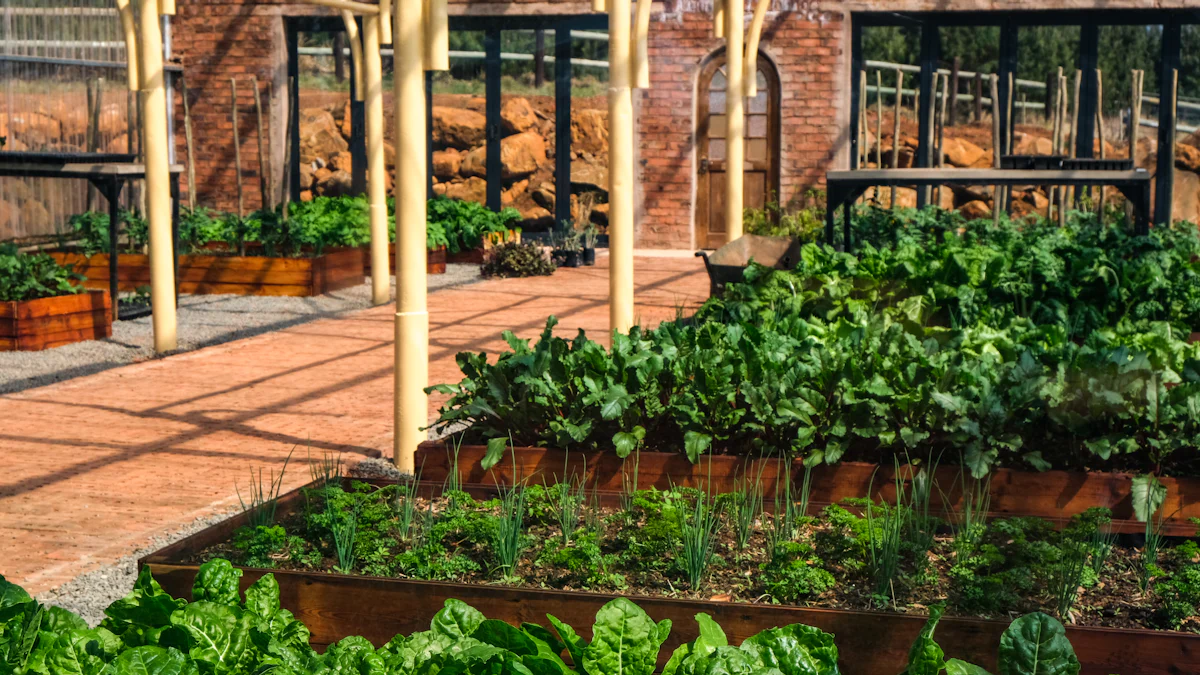
Choosing Sustainable Materials
Comparing wood, metal, and recycled options
Selecting the right materials for your raised garden beds is essential for eco-friendly gardening. Sustainable options like cedar, woodcrete composite, and galvanized steel offer durability and environmental benefits. The table below compares these materials to help you make an informed choice:
|
Material |
Sustainability Rating |
Durability |
Maintenance Requirements |
|---|---|---|---|
|
Cedar |
High |
8-10 years |
Low |
|
Woodcrete Composite |
High |
Long lifespan |
Low |
|
Metal (Galvanized Steel) |
High |
Up to 30 years |
Minimal |
|
Plastic |
Low |
Long biodegrading |
High |
Recycled materials like woodcrete composite stand out as a sustainable option. They are non-toxic, safe for growing food, and reduce waste accumulation. By choosing eco-friendly materials, you create a garden that supports the planet while lasting for years.
Ensuring durability and eco-friendliness
Durability is key when building raised beds. Cedar and galvanized steel resist weathering, ensuring your garden thrives season after season. Recycled materials like waste wood boards or branches also reduce environmental impact. Pair these with organic fertilizers and natural pest repellents to minimize harm to the ecosystem. Your choices can make a big difference in creating a sustainable garden.
🌱 Tip: Avoid treated wood, as it may leach harmful chemicals into the soil.
Selecting the Right Soil
Importance of well-draining, nutrient-rich soil
Healthy soil is the foundation of a thriving garden. Raised beds allow you to control soil quality, ensuring it is nutrient-rich and well-draining. This type of soil provides essential vitamins and minerals while allowing water and air to reach plant roots effectively. A balanced mix of clay, silt, sand, and organic matter creates the ideal environment for your plants.
-
Permeability ensures roots get the water and oxygen they need.
Creating a custom soil mix
Crafting your own soil mix gives you control over its composition. A classic mix includes one-third compost, one-third peat moss (or coconut coir as a sustainable alternative), and one-third vermiculite. This combination improves drainage, enhances nutrient levels, and supports healthier plants with stronger roots. Adding organic fertilizers like bone meal or fish emulsion throughout the season keeps your soil fertile and productive.
🌍 Note: Combine organic matter with garden soil in a 1:1 ratio for a balanced mix.
Picking the Best Plants
Beginner-friendly crops
Starting with easy-to-grow plants ensures success in your gardening journey. Leafy greens like lettuce, kale, and spinach thrive in raised beds. Herbs such as basil, cilantro, and parsley add flavor to your meals and are simple to cultivate. Root crops like carrots and radishes grow well in loose, well-draining soil. Compact varieties of tomatoes, peppers, and bush beans are also excellent choices for beginners.
-
Leafy Greens: Lettuce, kale, spinach, Swiss chard, and arugula.
-
Herbs: Basil, cilantro, parsley, mint, and thyme.
-
Root Crops: Carrots, radishes, beets, and onions.
-
Compact Vegetables: Tomatoes, peppers, bush beans, and cucumbers.
🌱 Tip: Choose plants suited to your climate and soil conditions for the best results.
Seasonal planting tips
Timing is everything in gardening. In spring, prepare your soil, control weeds, and prune plants. Summer requires regular watering, pest management, and harvesting. Fall is perfect for planting cool-weather crops, mulching, and protecting your garden from frost. The table below outlines seasonal tips to keep your garden thriving year-round:
|
Season |
Tips |
|---|---|
|
Spring |
Inspect soil, weed control, pruning and trellising. |
|
Summer |
Regular watering, pest management, and harvesting. |
|
Fall |
Plant fall crops, mulching, fall clean-up, protect from frost, and raised bed inspection. |
By following these tips for creating an eco-friendly garden, you can enjoy a lush, productive space that benefits both you and the environment.
Maintaining Your Raised Garden Beds
Regular watering and weeding
Keeping your raised garden beds healthy starts with consistent care. Watering deeply and regularly ensures your plants thrive, especially since raised beds drain more efficiently than traditional gardens. Focus on watering during cooler times of the day, like early morning or late evening, to reduce evaporation. Drip irrigation systems work wonders here, delivering water directly to the roots while conserving resources.
Weeding is another essential task. Removing weeds frequently prevents them from competing with your plants for nutrients and water. Adding a layer of organic mulch, such as straw or wood chips, helps suppress weed growth while retaining soil moisture. Mulch also improves soil health over time, making it a simple yet powerful tool for maintaining your garden.
🌱 Tip: Inspect your raised beds regularly for signs of damage or decay. Addressing issues early ensures your garden stays productive and sustainable.
To maintain long-term soil health, leave plant roots in the ground after harvesting. This practice keeps soil carbon intact and adds organic matter, enriching the soil for future crops.
Crop rotation for soil health
Rotating crops in your raised beds is a game-changer for soil health. By changing the location of plant families each season, you disrupt the life cycles of soil-dwelling pests, making it harder for them to target your plants. This method also limits the spread of diseases that accumulate in the soil over time.
Crop rotation boosts soil fertility naturally. For example, planting legumes like beans or peas enriches the soil with nitrogen, a vital nutrient for plant growth. Cover crops, such as clover or rye, planted in the fall, further enhance soil structure and prevent erosion.
-
Improves soil fertility with nutrient-rich crops.
-
Increases harvest yields by maintaining healthier soil.
🌍 Note: Plan your crop rotation by grouping plants into families (e.g., leafy greens, root vegetables, legumes) and rotating them annually. This simple strategy ensures your soil remains balanced and productive.
By mastering these maintenance practices, you create a thriving, sustainable garden that rewards you season after season.
Why Raised Garden Beds Are Key to a Sustainable Future
Reducing Your Carbon Footprint
Growing food locally to lower food miles
Raised garden beds empower you to grow your own food, reducing the need to rely on store-bought produce. By cultivating fruits, vegetables, and herbs at home, you eliminate the environmental costs of transporting food over long distances. This practice significantly lowers food miles, which are a major contributor to greenhouse gas emissions. Every tomato or lettuce leaf you grow in your backyard helps reduce the carbon footprint associated with industrial agriculture.
Decreasing dependence on industrial agriculture
When you use raised garden beds, you create a controlled environment that supports eco-friendly gardening methods. These beds allow you to use organic compost, practice crop rotation, and retain moisture with mulching. This reduces the need for synthetic pesticides and fertilizers, which are common in industrial farming. By growing your own food, you also enhance food security and build resilience against disruptions in the global food supply chain.
-
Raised beds promote organic practices, reducing chemical use.
-
They make gardening accessible to everyone, encouraging self-sufficiency.
-
Shared gardening spaces foster teamwork and community cooperation.
Promoting Community Sustainability
Inspiring eco-friendly practices in your neighborhood
Your raised garden beds can inspire others to adopt eco-friendly habits. By showcasing sustainable gardening techniques, you encourage neighbors to reduce soil disturbance, use recycled materials, and grow diverse plants. These actions promote environmental sustainability and create a ripple effect of positive change in your community.
Contributing to local food security
Raised garden beds play a vital role in improving food security. In urban areas, they provide a reliable source of fresh produce, especially for communities with limited access to healthy food. According to a USDA report, food security means ensuring everyone has access to enough nutritious food for an active, healthy life. Raised beds maximize space and productivity, allowing you to grow a variety of crops year-round.
🌱 Raised beds improve soil quality, leading to healthier crops and better yields. They also diversify diets and reduce dependency on single food sources.
Long-Term Environmental Impact
Preserving resources for future generations
Raised garden beds help preserve essential resources like soil and water. Their design minimizes soil compaction and erosion, ensuring long-term fertility. By using organic materials and efficient watering techniques, you conserve water and maintain soil health. These practices protect the environment and ensure future generations can enjoy the benefits of sustainable gardening.
Combating climate change through sustainable gardening
Sustainable gardening with raised beds contributes to the fight against climate change. Healthy soil in raised beds supports carbon sequestration, reducing greenhouse gases in the atmosphere. Practices like mulching and drip irrigation conserve water and protect local ecosystems. By growing diverse plants, you attract beneficial insects, enhance biodiversity, and create a balanced ecosystem.
-
Raised beds reduce the need for chemical fertilizers, lowering emissions.
-
They promote soil health, which is essential for capturing carbon.
-
Eco-friendly gardening practices support the planet and combat climate change.
By embracing raised garden beds, you take meaningful steps toward a sustainable future. These beds not only reduce your carbon footprint but also inspire community action and protect the environment for years to come.
Raised garden beds offer you a unique opportunity to create a greener, healthier future. They improve soil health, conserve water, and support biodiversity, all while reducing your reliance on harmful chemicals. On a personal level, they enhance your physical and mental well-being, provide access to fresh produce, and make gardening accessible to everyone.
🌱 Every seed you plant in a raised bed is a step toward sustainability.
By embracing raised garden beds, you join a growing movement of eco-conscious individuals. Start small, experiment with beginner-friendly crops, and watch your garden thrive. Together, we can cultivate a sustainable future—one raised bed at a time. 🌍



